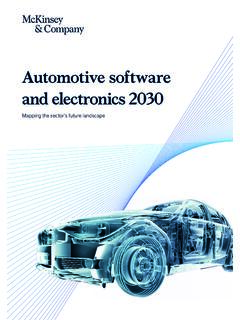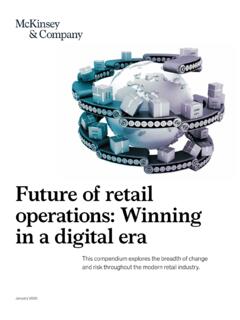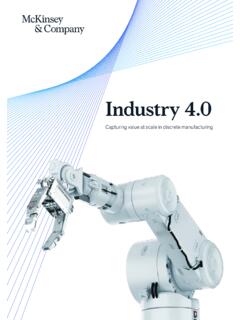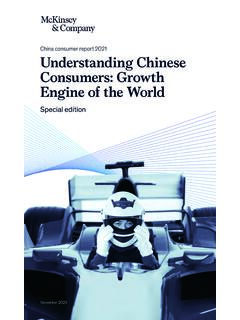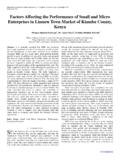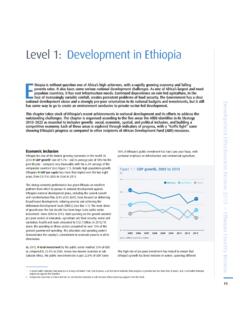Transcription of The great transformer: The impact of the Internet on ...
1 McKinsey Global Institute The great transformer: The impact of the Internet on economic growth and prosperity James Manyika and Charles Roxburgh October 2011 INTRODUCTION The Internet is changing the way we work, socialize, create and share information, and organize the flow of people, ideas, and things around the globe. Yet the magnitude of this transformation is still underappreciated. The Internet accounted for 21 percent of the GDP growth in mature economies over the past 5 years. In that time, we went from a few thousand students accessing Facebook to more than 800 million users around the world, including many leading firms, who regularly update their pages and share content. While large enterprises and national economies have reaped major benefits from this technological revolution, individual consumers and small, upstart entrepreneurs have been some of the greatest beneficiaries from the Internet s empowering influence.
2 And yet we are still in the early stages of the transformations the Internet will unleash and the opportunities it will foster. Many more technological innovations and enabling capabilities such as payments platforms are likely to emerge, while the ability to connect many more people and things and engage them more deeply will continue to expand exponentially. As a result, governments, policy makers, and businesses must recognize and embrace the enormous opportunities the Internet can create, even as they work to address the risks to security and privacy the Internet brings. As the Internet s evolution over the past two decades has demonstrated, such work must include helping to nurture the development of a healthy Internet ecosystem, one that boosts infrastructure and access, builds a competitive environment that benefits users and lets innovators and entrepreneurs thrive, and nurtures human capital.
3 Together these elements can maximize the continued impact of the Internet on economic growth and prosperity. THE Internet IS DRIVING ECONOMIC GROWTH From an obscure network of researchers and technology experts three decade ago, the Internet has become a day-to-day reality for more than a quarter of the world s people. Today two billion people are connected to the Internet , and almost $8 trillion exchange hands each year through e-commerce. Strong contribution to GDP growth Across a range of large and developed economies, the Internet exerts a strong influence on economic growth rates. Our research shows that the Internet accounts for, on average, percent of GDP across the large economies that make up 70 percent of global GDP. (See Exhibit 1.) If Internet consumption and expenditures were a sector, its weight in GDP would be bigger than the energy or agriculture industry.
4 (See Exhibit 2.) The Internet s total contribution to global GDP is bigger than the GDP of Spain or Canada, and it is growing faster than the GDP of Brazil. McKinsey Global Institute The great transformer: The impact of the Internet on economic growth and prosperity 2 EXHIBIT 1 The Internet constitutes percent of GDP in large and developed economiesSOURCE: McKinsey Global Institute, Internet matters: The net s sweeping impact on growth, jobs, and prosperity, May 20111,37636209395736 TotalTrade balancePublic expenditurePrivateinvestmentPrivate consumption1 We looked at the Internet contribution in 13 countries constituting 70% of global GDP. The countries studied include G8 countries; China, India, and Brazil (emerging countries); and Sweden and South Korea (as they are most advanced countries in terms of broadband penetration).
5 2 For the rest of the world, we used estimated percentage shares based on Internet penetration in each contribution to GDP in select large and developed economies,12009$ billionShare of GDP%Total estimated worldwide contribution of Internet : $1,672 billion ( percent of total GDP) percent of GDP EXHIBIT 2 SOURCE: Organisation for Economic Co-operation and Development; McKinsey analysisIf Internet were a sector, it would have a greater weight in GDP than agriculture or utilitiesSector contribution to GDP, 2009% of total GDP1 Internet share includes parts of other sectors ( , communication). : manufacturingConstructionHealth careFinancial servicesReal estateUtilitiesAgricultureCommunicationE ducationTransportation McKinsey Global Institute The great transformer: How the Internet is changing the globe and its citizens 3 In the advanced economies we studied, the Internet accounted for 10 percent of GDP growth over the past 15 years, and its influence is growing.
6 Over the past five years, the Internet s contribution to GDP growth in these countries doubled to 21 percent. If we include the large, emerging economies of China, India, and Brazil, the Internet contributed 7 percent of growth over the past 15 years and 11 percent over the past five. In countries such as Turkey, Malaysia, and Mexico, where both Internet usage and GDP per capita fall within the medium range on the global scale, the Internet has also contributed substantially to economic growth, though to a lesser degree than in mature economies. Research currently under way suggests the Internet drove roughly half as much GDP growth in these countries still a substantial amount with the potential to increase significantly. However, there is sizable variation among countries, including those at relatively similar stages of development, leaving tremendous room for further Internet -related growth.
7 Internet ecosystem maturity related to rising living standards There is also a clear connection between the maturity of the Internet ecosystem1 and rising living standards. We found that an increase in Internet maturity similar to the one experienced in advanced countries over the past 15 years correlates with an increase in real per capita GDP of $500 on average during this period. It took 50 years for the Industrial Revolution of the 19th century to achieve the same results. This demonstrates both the magnitude of the positive impact the Internet delivers to all levels of society and the speed at which it delivers them. The correlation to increased living standards is particularly relevant for developing economies, where the potential exists to rapidly leap forward and drive Internet -related growth.
8 Although the United States has thus far led in terms of the strength of its Internet infrastructure, access, and innovation, the landscape is evolving rapidly. India, China, and Brazil have the fastest-growing ecosystems, and other developed and developing countries are rapidly growing their usage through improved infrastructure and access. The Internet drives business transformation and economic modernization Rejuvenating traditional activities has been the Internet s main impact . The Internet has enabled fundamental business transformations that span the entire value chain in virtually all sectors and types of companies not just online ones. These shifts include wholesale changes not only in how products are bought and sold but also in how products and services are designed, produced, and distributed.
9 Even a tiny business today can operate with a dynamically managed supply chain that spans geographies and operates with a global workforce. Our global Small and Medium Enterprise (SME) survey found that 75 percent of the economic impact of the Internet accrued to traditional companies that would not define themselves as pure Internet players. These businesses have benefited from the higher productivity the Internet enables. The Internet can also serve as a powerful catalyst for job creation. Of course the Internet has made some jobs obsolete. However, early evidence suggests the Internet can be a net job creator. Jobs are created in the Internet ecosystem itself, as Internet companies hire workers 1 The McKinsey Global Institute created an index to reflect Internet maturity of a country.
10 Referred to as the e3 index, it measures e-ngagement, e-nvironment, and e-xpenditure, which are themselves largely based on numbers provided by the World Economic Forum and OECD. Weighing these three components, the e3 index represents the depth of a country s maturity in access infrastructure and Internet usage by individuals, businesses , and governments. Scandinavian and North American countries, three north European countries (the Netherlands, Switzerland, and the United Kingdom), and South Korea capture the top ten positions in our e3 rankings. See McKinsey Global Institute, Internet matters: The Net s sweeping impact on growth, jobs, and prosperity, May 2011. McKinsey Global Institute The great transformer: The impact of the Internet on economic growth and prosperity 4 ranging from engineers to sales and service personnel who design and deliver Internet products and services.





